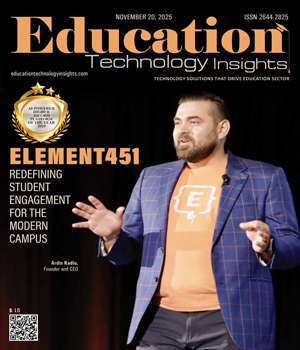THANK YOU FOR SUBSCRIBING
Be first to read the latest tech news, Industry Leader's Insights, and CIO interviews of medium and large enterprises exclusively from Education Technology Insights
Elevating Education with Purposeful Tech-Integration
Dr. Alexandra Read, Head of Learning Technology, Girls' Day School Trust (GDST)
 Dr. Alexandra Read, Head of Learning Technology, Girls' Day School Trust (GDST)
Dr. Alexandra Read, Head of Learning Technology, Girls' Day School Trust (GDST)Dr. Alexandra Read is a seasoned edtech professional experienced in driving innovation and digital transformation across learning environments. Her diverse leadership journey shapes her role as Head of Learning Technology at The Girls' Day School Trust GDST, where she works with the 26 girls' schools in the trust to embed transformative strategies.
In an interview with Education Technology Insights Europe, Dr. Read shared insights on the impact of strategic technology integration in education and the importance of integration grounded in risk management and security.
Empowering Learning through EdTech Leadership
I began my career as an English teacher at Collier County Public Schools. A combination of professional roles, including digital lead, head of the year and department chair, in tandem with completing my master's degree in educational technology from Florida Gulf Coast University, dramatically changed my pedagogical focus. My studies confirmed the importance of evidence-based education and fuelled a desire to conduct my own research. I decided to pursue a doctorate in educational leadership from the University of Central Florida.
Pedagogy-Aligned Technology Leadership
My doctoral research explored the relationship between the technological proficiency of school leaders and that of their staff and students. The findings confirmed that competent leadership has the potential to transform the educational landscape. Purposeful use of technology can support school-wide development and foster a culture of collaboration, innovation and excellence.
Following this experience, I joined ACS International Schools as a technology teacher and integrationist when mobile technology was emerging, to support their 1:1 device rollout. I led the digital strategy at ACS Cobham Campus, co-ordinating the development of technology together with online safety across the schools and leading initiatives in action research, data-driven learning and curriculum design at ACS Hillingdon Campus.
“Successful use of AI will help students develop their intelligence and the skills that set them apart from their artificial counterparts. This is why human experience must be the most important aspect of any AI strategy”
In my current role at the GDST, our focus is on educating girls and young women with a strong emphasis on purposeful, appropriate and socially responsible use of technology.
Working with colleagues in a diverse range of educational settings has helped me understand that a successful strategy also builds the digital capacity of leadership teams. Sustainability is only possible when whole-school initiatives embed technology into a culture of learning and collaboration supported by leadership who are willing to participate fully in the journey and invest in meaningful professional development and pedagogical alignment with the school’s overarching mission and vision.
Strategic Integration of EdTech
Impactful technology adoption is anchored in its alignment with long-term goals of schools, driving personalised and engaging pedagogy and enabling sustainable integration across existing infrastructure and curriculum. Strategic planning must holistically address collective decision-making, community engagement, infrastructure readiness and staff wellbeing, fostering shared ownership through inclusive, transparent processes.
Cybersecurity, data privacy and inclusive access for students must be prioritised through rigorous threat assessments and seamless operational integration. Technical support availability and inclusion in the planning process enhance sustainable and equitable implementation.
Fostering an Educator-Focused Digital Learning Culture
A comprehensive strategy focusing on professional development and wellbeing creates a supportive teacher culture. Dedicated technology-related trainings with accommodating schedules empower teachers to explore and create pedagogy-supporting digital resources.
Digital initiatives must be inclusive and responsive to teacher needs, workload and progress. Proactive tech-supportive environments encourage teachers to ask questions and take risks.
To ensure ongoing relevance and effectiveness, regulated feedback mechanisms must be adaptive to teacher input.
The Future of Tech-Driven Education
As AI transforms education, learners will benefit from personalised environments driven by metacognition and neuroscience. Successful use of AI will help students develop their intelligence and the skills that set them apart from their artificial counterparts. This is why human experience must be the most important aspect of any AI strategy. A key aspect of this transformation is from passive information consumption toward active, hands-on methods of acquiring knowledge alongside social skills like building connections and communication skills to actively seek and maximise opportunities.
Immersive technologies like AR and VR will transcend boundaries opening up access to experiential learning environments that were previously inconceivable. Data-informed performance insights will provide learners with real-time feedback and support from educators.
Advice for Technology-Informed School Leader
Encouraging digital innovation while maintaining academic rigour requires intentional leadership empowered by strategic planning and a commitment to professional learning. Transformative digital strategies emerge not in isolation, but through deep collaboration between school leaders and stakeholders, united by a shared vision for impactful learning. These strategies must be firmly embedded in pedagogical philosophies at schools, ensuring their visions are driven by feasibility and sustainability.
Maintaining this rigour requires investing in professional development that builds digital proficiency in staff and students. Exploring new technologies must be grounded in safeguarding measures and risk management to ensure data security and privacy.
Read Also
Navigating Course Map Design
Beyond the Classroom: Supporting Belonging and Wellbeing for International Students
Building Responsible AI Practice Across a University
Designing Engagement That Lasts
Digital Creativity as a Catalyst for Deeper Learning
Protecting Precious Cargo: A Comprehensive Look at School Bus Safety

I agree We use cookies on this website to enhance your user experience. By clicking any link on this page you are giving your consent for us to set cookies. More info

However, if you would like to share the information in this article, you may use the link below:
www.educationtechnologyinsightsapac.com/cxoinsights/dr-alexandra-read-nid-3458.html






















